TechRadar Verdict
The Panasonic GZ2000 is undoubtedly one of the best OLED televisions, if not the best television, of 2019. With its rich custom panel and a 140W Dolby Atmos speaker system, you’re getting an exceptional experience for both your eyes and ears.
Pros
- +
Incredible sound system
- +
Custom OLED panel
- +
Picture quality to die for
Cons
- -
Poor app support
- -
No HDMI 2.1
Why you can trust TechRadar
Few televisions released this year have quite the swagger of the Panasonic GZ2000. Sitting at the very top of Panasonic’s 2019 TV range, this flagship 4K OLED offers the best of the company’s HCX Pro Intelligent processing, with a custom-made OLED panel to distinguish it from the cheaper Panasonic GZ1500 and GZ950 / GZ1000 models.
That’s not to mention the broad HDR format support Panasonic has introduced across its mid-range and high-end sets. However, while even the sub-£1,000 GX800 model packs in the likes of Dolby Vision, HDR10+, and HLG, it’s the GZ2000 that should really show off these formats at their best.
With a truly massive built-in speaker system as well, the GZ2000 has the power to impress our ears as well as our eyes – but how did it fare in our tests? Here’s our Panasonic GZ2000 TV review.
After something new for 2020? Here's our first look at the Panasonic HZ2000 OLED TV, landing later this year.
Price and availability
The Panasonic GX2000 is available in two sizes, 55-inch and 65-inch, priced at £3,299 and £4,399 respectively. That’s quite a jump from the next model down in the company’s 2019 TV range, the GZ1500, which retails at £2,299 / £2,999 for the same sizes.
Panasonic doesn’t sell televisions in the United States, but you can find its sets in the UK, Europe and Canada, while the 65-inch GZ2000 model is available for AU$8,299 in Australia.
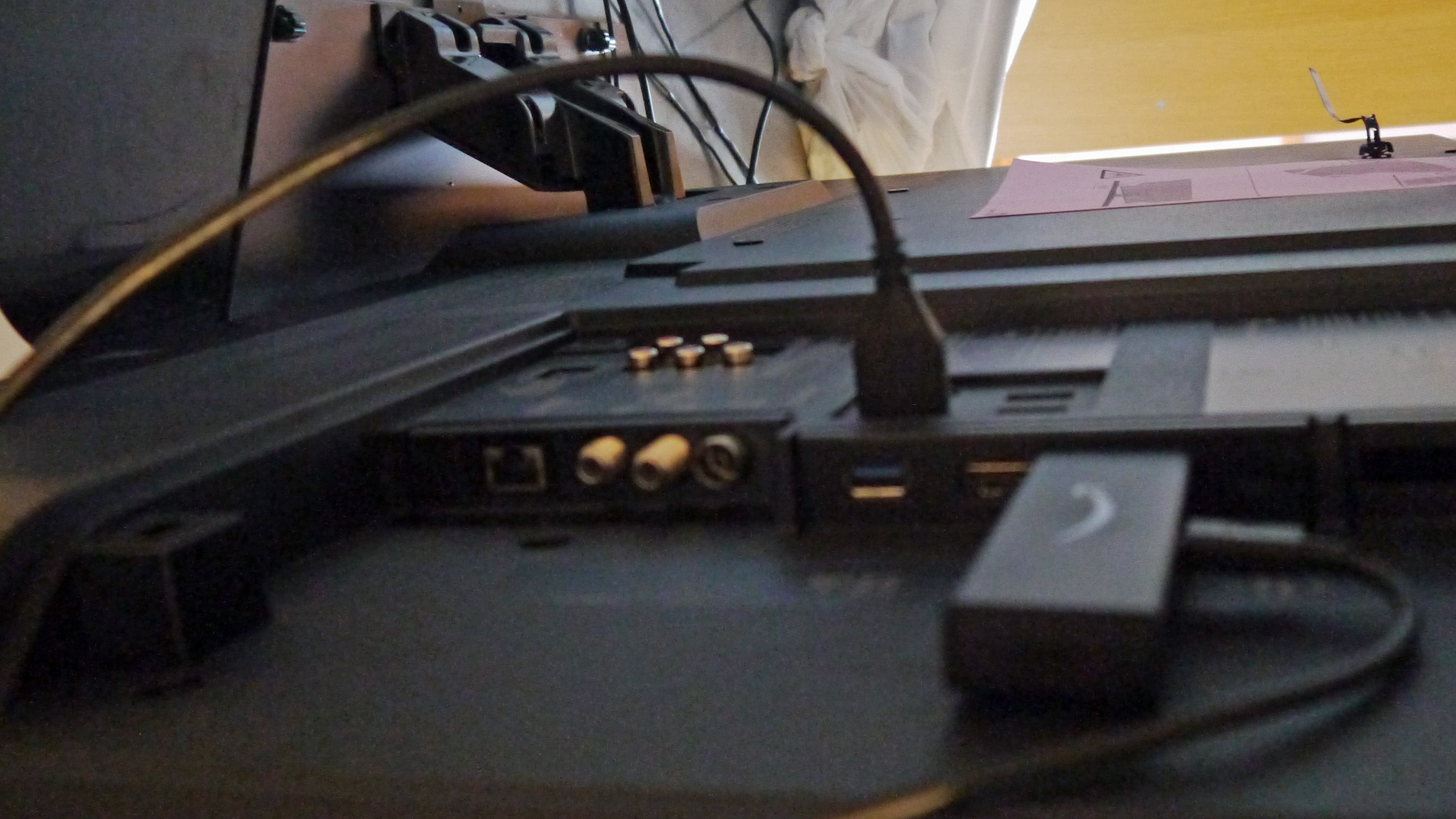
Design
The Panasonic GZ2000 cuts an imposing figure – especially from the sides. There’s an extensive 140W speaker system that adds a huge amount of weight to the rear, as well as a thick soundbar built into the bottom of the panel – which is raised about 18mm with the substantial TV stand.
Its dimensions are 1446 x 905 x 78mm, including the square-shaped stand. Whether you opt for the 55-inch or 65-inch model, there’s no doubting that this is a statement TV.
Beneath a detachable flap in the TV’s rear casing are four 4K-enabled HDMI ports, including HDMI ARC for connecting external soundbars (not that you’ll need it). There are also two USB ports, plus Ethernet, CI, Component, and headphone outputs. While the front of the television accurately conveys the impression of high-spec hardware, the rear features thick plastic casing that doesn’t have the same premium feel.
The remote is finished in a sleek, brushed silver, and features numerical channel inputs as well as the expected settings, apps, home, guide, source, and playback buttons. A neat addition here is a ‘light’ button to backlight the majority of the buttons – hugely convenient when you’re watching a movie in the dark – while a MyApp button enables you to hotkey one input to a regularly-used app of your choice.
Design TL;DR Even at the 55-inch size, the GZ2000 looks impressive, thanks in part to its soundbar and sound system. The remote is well designed too.
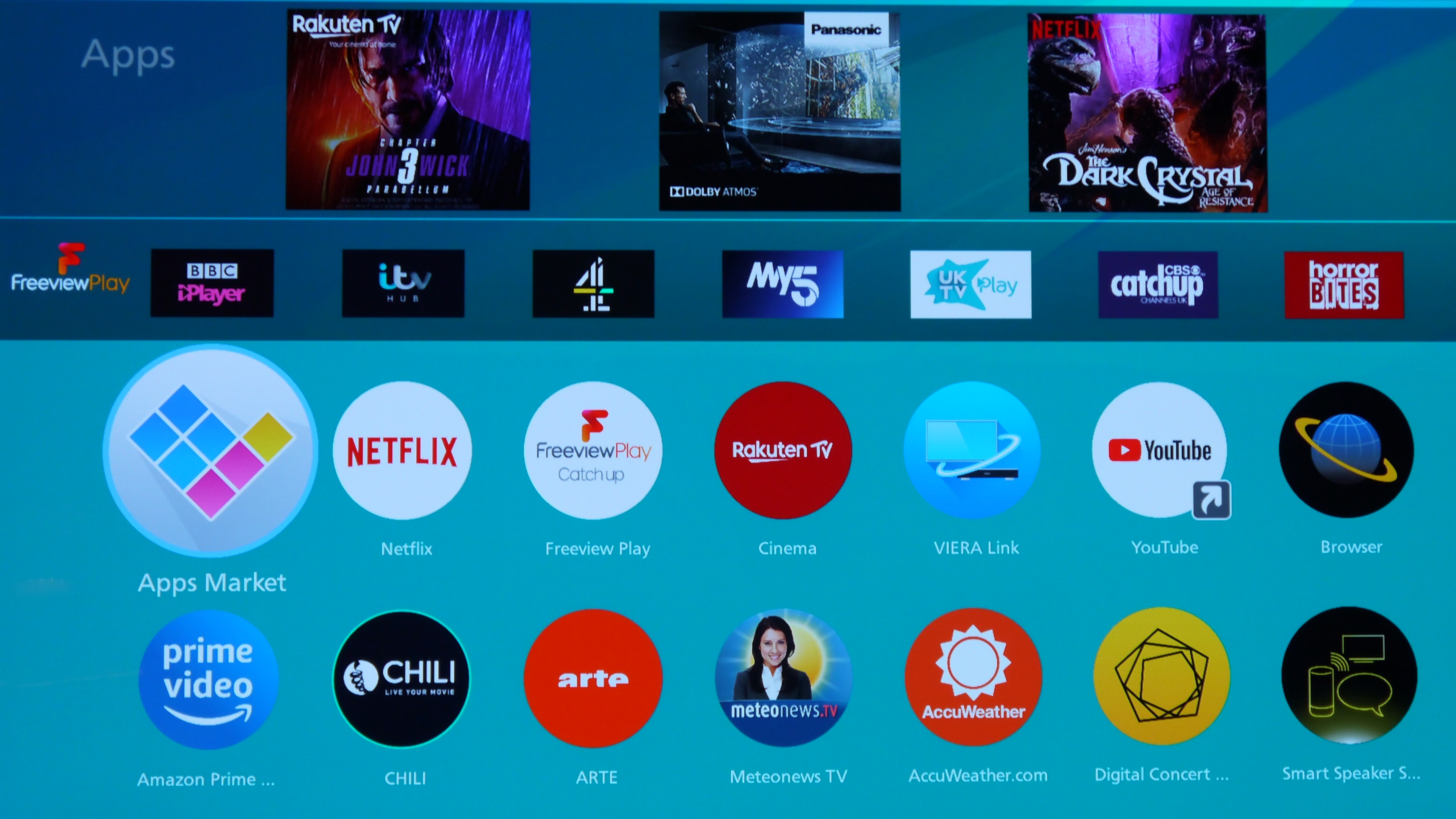
Smart TV: MyHomeScreen 4.0
Panasonic uses its own MyHomeScreen smart TV platform in the majority of its TVs, which is deployed in the GZ2000.
Unlike some other TV platforms, MyHomeScreen doesn’t mute or pause the action when you call up the Home menu, which occupies the lower half of the screen and can be customized to include your favourite apps in addition to the default Devices, Apps, and Live TV options.
Scrolling down will also spin new sections of the menu towards you, showing miniature Netflix and live TV interfaces, though it’s often easier to jump straight into an app from the main menu, or hit the Apps button on the remote.
Our only real criticism of the GZ2000 is more to do with Panasonic TVs in general than this particular set, and it concerns Panasonic’s poor app support.
The manufacturer still uses a smart platform based on Firefox OS, and has struggled to get dedicated apps on to it beyond those of a few major players like Netflix, Amazon Prime, YouTube, Freeview Play (in the UK).
You won’t find Spotify, Tidal or Deezer here, for instance, and the lack of a music showing on the GZ2000 is especially disappointing given its extensive audio capabilities. We recommend getting a streaming stick like the Amazon Fire TV Stick 4K or Roku Ultra if you want a broader range of support here.
As usual on a modern smart TV, there’s a selection of picture presets: Dynamic, Normal, True Cinema, and Sports. Dynamic will up the contrast, but kills the accuracy of the colour. True Cinema makes for a more atmospheric, easy-on-the-eyes effect, while Normal is somewhere between the two. Sports, unsurprisingly, is for watching sport events, and ups the contrast and motion handling to ensure a smooth picture, in which you can clearly make out figures against the background of a pitch, for example.
Smart TV TL;DR A simple, customisable menu interface helps you get access to your favourite apps quickly, even if there aren’t as many apps supported as we’d like.
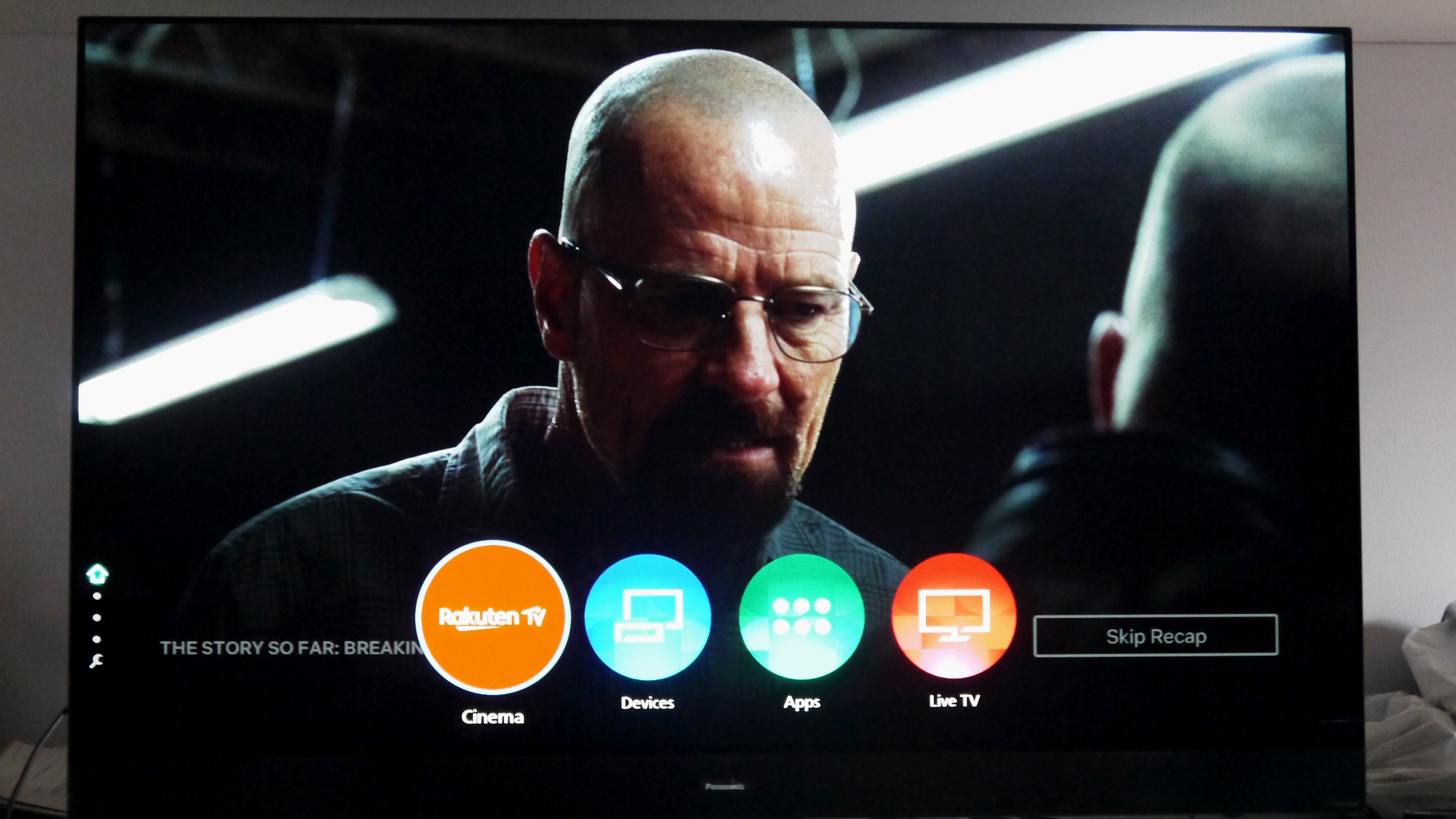
HD/SDR performance
While this is a 4K TV, most of the content available via broadcast or streaming these days is still in HD, so it’s important to know how lower-resolution content will fare on Panasonic’s screen.
We can confirm that the GZ2000 excels at displaying HD/SDR content, with all the precision and detail expected from Panasonic’s latest HCX Pro Intelligent processor employed in its 2019 OLED TVs. Motion is consistently smooth, even in fast-moving scenes.
Taking advantage of the latest free PS Plus games this month, we playedThe Last of Us 2 Remastered, and found even the rapid, jerky movements of attacking zombies or rushing soldiers didn’t give the GZ2000’s frame rate any trouble. Auto Low Latency when playing games helps, even if the HDMI ports use the 2.0 standard instead of the newer HDMI 2.1, which enables 4K passthrough at 120Hz (or 8K at 60Hz) instead of 4K at 60Hz.
Despite the fact that Panasonic TVs aren’t commercially available in North America, its cinematic sets are favourites of professional Hollywood colourists, on account of the fact that they offer highly controlled colour mapping.
This is fantastic for accuracy of tone and shade, although pictures don’t always have the ‘pop’ of colours you’ll find on LG’s OLED TVs. The difference, though, isn’t that big – and you can’t really argue with having a picture that Hollywood colourists would approve of.
The GZ2000 in particular is the go-to reference monitor for Company 3 and leading colourist Stefan Sonnenfeld, whose work includes Wonder Woman, A Star is Born and Star Wars: The Force Awakens, with Sonnefeld saying it delivers “close to a reference grade on a consumer set” in terms of colour accuracy.
HD/SDR performance TL;DR Incredible colour accuracy and low-latency gaming make this a standout television, whether you’re watching movies and TV shows or settling in with a console game.

4K/HDR performance
As expected on a premium OLED TV, the Panasonic GZ2000 handles HDR (high dynamic range) masterfully, with a rich and vibrant picture befitting Panasonic’s flagship OLED TV.
Watching Netflix’s The Politician, the opening scene’s fireplaces flicker with almost ethereal light against the dark wooden interiors, while the runway-ready outfits of much of the cast look bold and brash on the infinite-contrast OLED panel. The control and restraint of the GZ2000 is truly a dream to behold, showing off HDR content at its very best – while colour-rich shows like The Art of Design (also on Netflix) will bathe your living room in glowing reds, yellows, and more.
You may have to get used to the glow of white subtitles on dark backgrounds, which is usually a lot less prominent on LCD TVs, but you can rest assured that this glow is being emitted by the panel, and not the result of whites blooming in the pixels around the text.
You won’t find yourself unable to play a particular HDR format either, with Panasonic supporting Dolby Vision, HDR10+, HLG, and HLG Photo Mode on all of its high-end and mid-range sets. While some manufacturers continue to back a single horse (like Samsung with HDR10+), knowing you have the format support for anything that Netflix, Amazon Prime, or your 4K Blu-ray movies throw at you is very reassuring.
4K/HDR TL;DR Panasonic’s flagship OLED offers a predictably excellent 4K picture, with a custom-made OLED panel that brings colourful images to life, and broad HDR format support is a nice bonus.
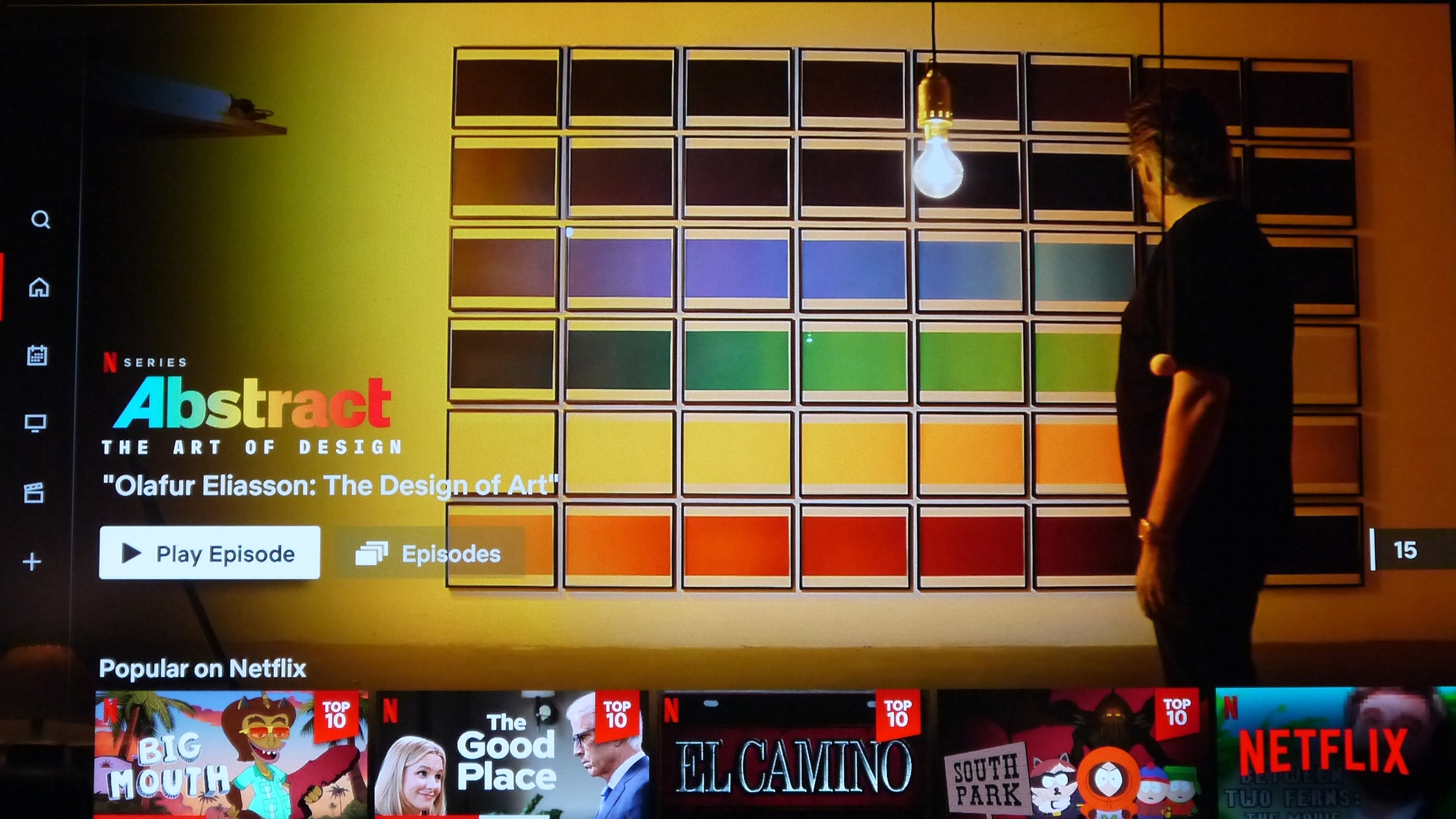
Sound
Possibly the most impressive feature of the GZ2000, though, is the speaker system.
The set features both up-firing speakers at the rear, and a soundbar integrated into the bottom of the panel. The soundbar offers solid simulated surround sound channels, while the top channels deliver the enveloping overhead sounds that make the object-based Dolby Atmos sound mixes so captivating.
These speakers have been tuned by Panasonic’s Technics audio engineers in collaboration with Dolby itself, using the Technics Jeno audio engine to deliver subtle sound detail in busy scenes. The set also supports output to a discrete subwoofer, should you want to beef up the low end with another standalone unit.
All of this is a rather technical way of saying that the GZ2000 has some serious sound credentials, which elevated pretty much any movie, TV show or album we played through it. Watching the third season of GLOW on Netflix, we found the Dolby Atmos-enabled speakers were able to accurately map voices and other sounds from different parts of the picture, adding a layer of immersion that would be missing from cheaper speakers.
When playing the music video for Florence + The Machine’s What Kind of Man, meanwhile, we found that intricate details from the audio came out in force, with the hushed sounds of rain and stormy weather – which would be buried under the melody on average TV speakers – were brought forward with subtle clarity.
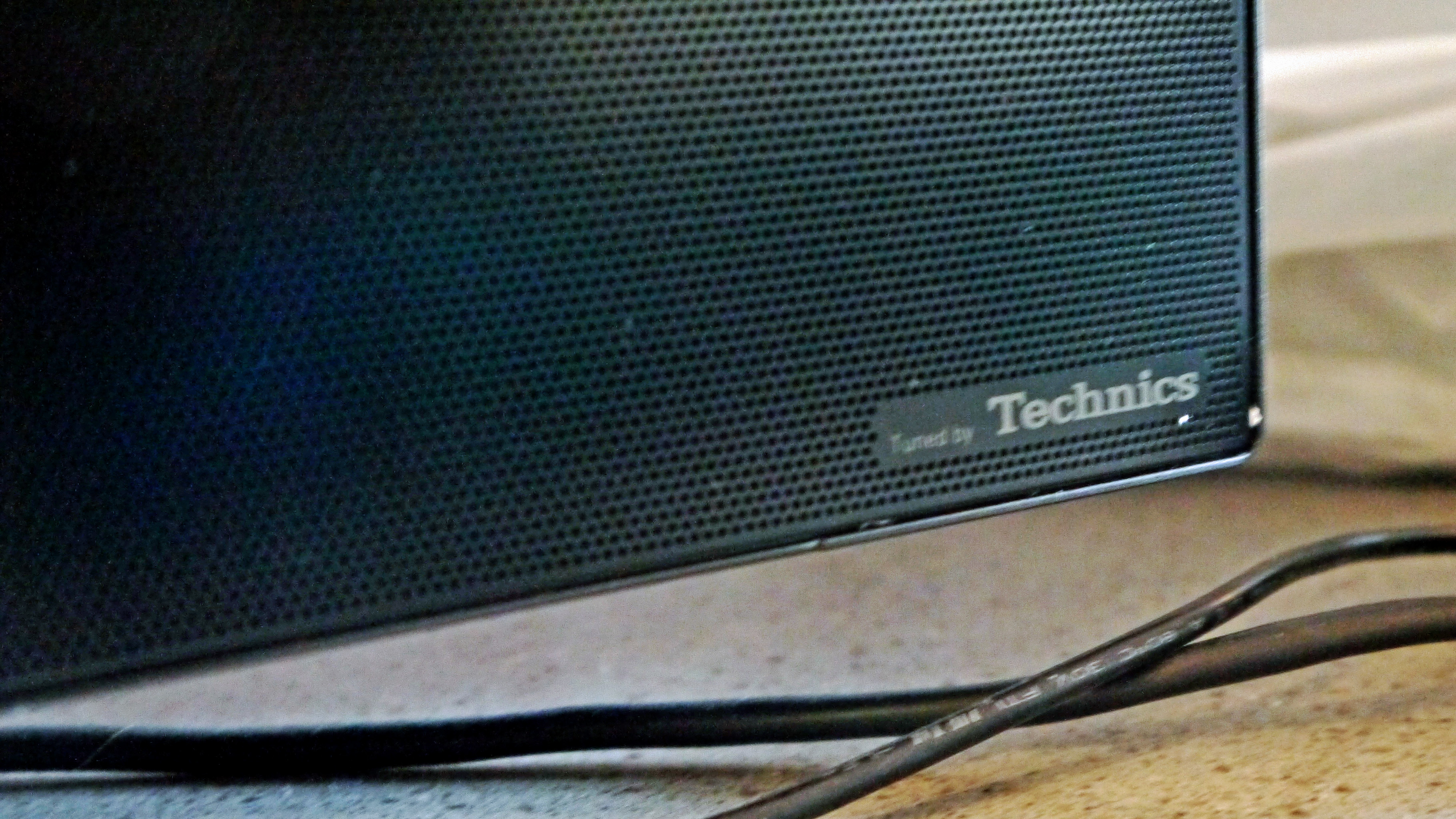
An adverse effect of the GZ2000’s powerful speakers, though, is that faint sounds can be given a little too much weight. When watching Baby Driver, we found the TV was more than capable of blasting out its rollicking soundtrack, and capturing the squeal of tyres and crash of metal in its high-speed chase sequences, but would also give a bassy resonance to voices in the film’s quieter moments – resulting in an effect akin to whispering into a megaphone.
Popping into the audio settings and reducing the bass levels (to around -10) helped this; there is a separate Speech mode, but it has the effect of bringing voices more forward, rather than ameliorating this particular issue.
That said, the complexity of Dolby Atmos-tuned audio, and the general power of the 140W speakers, will ensure you’re not left straining to make out the finer details, or denied the wow factor you’re likely seeking in such a premium television.
Sound TL;DR The Panasonic GZ2000’s upward-firing speakers and built-in soundbar deliver a high-end audio experience befitting a cinematic TV. You can get more oomph into your living room with a dedicated surround sound system, but the GZ2000 more than gets by without it.
Other panels to consider
Panasonic has a number of other high-quality OLED TVs, if you don’t need the boosted audio of the GZ2000 or are wary of annoying your neighbours with your late-night movie sessions.
The GZ1500 and GZ1000 have the same ‘standard’ OLED panel, rather than the custom panel of the GZ2000. Both these sets are still premium offerings, but also offer less in the sound department, so may be a better buy if you have an existing audio setup ready to hook up to your new television.
LG has a number of new OLED TVs out this year too, and the ‘floating’ panel design of its E9 helps to deliver an impressively rich picture, though the LG C9 OLED offers the same panel in a slightly more affordable housing.
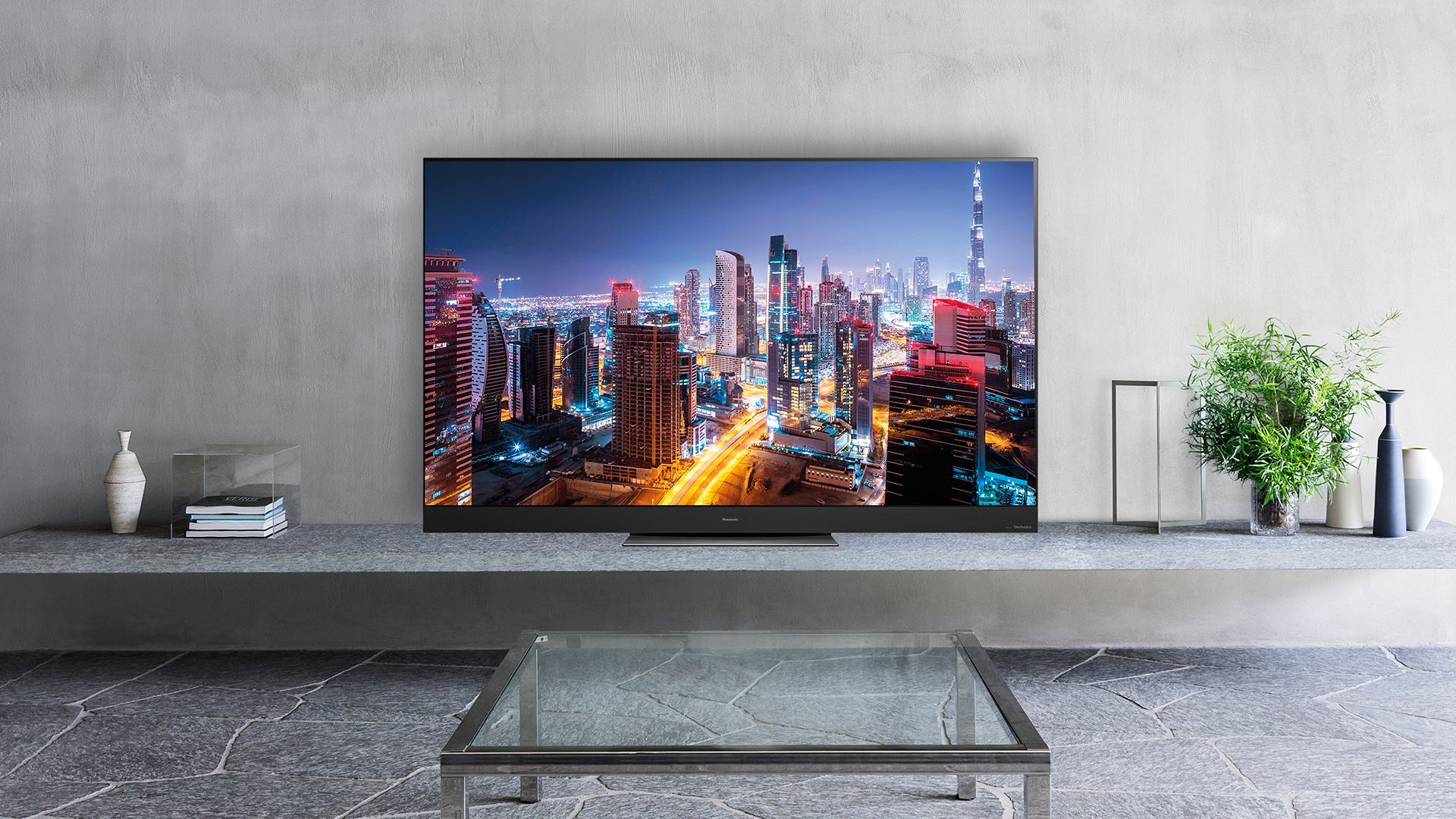
Final verdict
The Panasonic GZ2000 is undoubtedly one of the best OLED televisions, if not the best television, of 2019. With its rich custom panel and a 140W Dolby Atmos speaker system, you’re getting an exceptional experience for both your eyes and ears. Small issues around Panasonic’s app support are easily fixed with an external streaming stick, even if it grates to have to use third-party hardware with such a premium set.
You’re naturally paying a hefty premium for this experience, too, and if you have an existing audio setup that you can put to use you probably don’t need everything the GZ2000 offers. But if you want a top-tier television, and you have the necessary cash, this may well be the TV you’ve been waiting for.
- What are the very best OLED TVs out there?
Henry is a freelance technology journalist, and former News & Features Editor for TechRadar, where he specialized in home entertainment gadgets such as TVs, projectors, soundbars, and smart speakers. Other bylines include Edge, T3, iMore, GamesRadar, NBC News, Healthline, and The Times.
